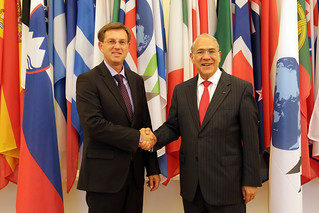Slovénie
Introduction of Prime Minister of Slovenia, Dr. Miro Cerar at OECD Council
|
1320th Session of the OECD Council Introductory remarks by Angel Gurría, Secretary-General, OECD OECD, Paris, 8 July 2015
It is my great honour to introduce to Council the Prime Minister of Slovenia, Dr. Miro Cerar, who will enlighten us on the topic of the “OECD as an important partner for responsible reform”.
|
8 July 2015 (from left) - Miro Cerar, Prime Minister of Slovenia, and OECD Secretary-General Angel Gurría at OECD Headquarters, Paris, France. |
An ambitious reform agenda underway
When I visited him in Ljubljana in May, to launch the 2015 Economic Survey of Slovenia, I was delighted to see first-hand the government’s energy and drive to raise living standards through ambitious reforms.
Since my visit, reform momentum has been sustained:
– all very much in line with OECD recommendations!
A ‘2050 Vision’ for sustainable development in Slovenia
But, far from resting on his laurels, Prime Minister Cerar is looking far into the future. To transcend the day-to-day imperatives of governing, his government has set itself the task of defining a long-term strategic vision for the country to 2050, supported by a detailed roadmap to 2030 and interim 5-year targets. These targets will, in turn, be linked back to the annual budgetary cycle so that all aspects of public policy are pulling in the same direction.
Slovenia’s laser-like focus on improving well-being across a range of dimensions is not only closely aligned with the OECD’s own focus on inclusive growth, but is inspired by the path-breaking universality of the Sustainable Development Goals, set to be agreed in New York in September. Slovenia is showing impressive intellectual leadership!
The OECD is a proud partner for reform
For its part, and in close coordination with Ambassador Jarc, the OECD has established a Slovenia Task Force to support these efforts and deepening bilateral engagement more generally. We are ‘going national’ with our strategic foresight capacity, so that we can help a small, open economy like Slovenia ‘surf the waves’ of global megatrends, preparing and building resilience for a range of possible scenarios.
On the labour market front, we are carrying out an activation review, with a particular focus on boosting employment among the elderly and long-term unemployed. While the recent reforms are small steps in the right direction, Slovenia still spends only around half the OECD average on labour market activation – these can be a valuable investment in human capital, and the OECD is well placed to share cross-country best practices on their design.
We don’t know what the world will look like by the middle of the century, but we do know that our economies will be increasingly knowledge driven, and successful societies will require rounded individuals with a full range of hard and soft skills if they are to thrive. Using the three legs of our analytical stool for education – PISA, PIAAC and now TALIS – the OECD stands ready to help Slovenia design, develop and deliver better skills policies for better lives.
What these three themes have in common – activation, skills and strategic foresight – is that they are about making peoples’ lives better. This is exactly what the OECD is here for! Drawing on the full range of our analytical capacities, we are proud to partner with you, Prime Minister, as you embark on your crucial, yet challenging, mission to chart a course for better future by 2050.
Prime Minister Cerar, we await your marching orders, and it is with great pleasure that I now give you the floor.
Thank you! |
|
Documents connexes
